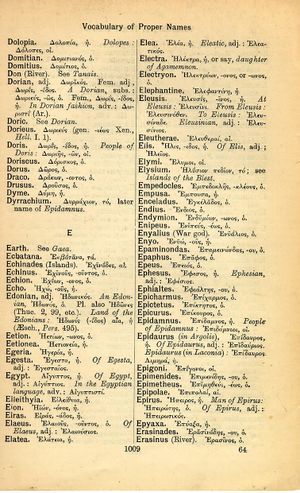Epirus: Difference between revisions
(Gf-D_3) |
(3_5) |
||
| Line 12: | Line 12: | ||
{{Gaffiot | {{Gaffiot | ||
|gf=<b>Ēpīrus</b>¹¹ <b>(-[[ros]])</b>, ī, f. (Ἤπειρος), l’Épire [province occidentale de la Grèce, auj. l’Albanie] : Cic. Att. 2, 4, 5 || <b>-rōtēs</b>, æ, n., Épirote : Plin. 3, 98 || m. pl. Épirotes, habitants de l’Épire || <b>-rēnsis</b>, e, d’Épire : Liv. 8, 17, 9 ; ou <b>-ōtĭcus</b>, a, um, Cic. Att. 5, 20, 9.||<b>-rōtēs</b>, æ, n., Épirote : Plin. 3, 98||m. pl. Épirotes, habitants de l’Épire||<b>-rēnsis</b>, e, d’Épire : Liv. 8, 17, 9 ; ou <b>-ōtĭcus</b>, a, um, Cic. Att. 5, 20, 9. | |gf=<b>Ēpīrus</b>¹¹ <b>(-[[ros]])</b>, ī, f. (Ἤπειρος), l’Épire [province occidentale de la Grèce, auj. l’Albanie] : Cic. Att. 2, 4, 5 || <b>-rōtēs</b>, æ, n., Épirote : Plin. 3, 98 || m. pl. Épirotes, habitants de l’Épire || <b>-rēnsis</b>, e, d’Épire : Liv. 8, 17, 9 ; ou <b>-ōtĭcus</b>, a, um, Cic. Att. 5, 20, 9.||<b>-rōtēs</b>, æ, n., Épirote : Plin. 3, 98||m. pl. Épirotes, habitants de l’Épire||<b>-rēnsis</b>, e, d’Épire : Liv. 8, 17, 9 ; ou <b>-ōtĭcus</b>, a, um, Cic. Att. 5, 20, 9. | ||
}} | |||
{{Georges | |||
|georg=Ēpīrus (Ēpīros), ī, f. (Ηπειρος), eine [[Landschaft]] Griechenlands [[zwischen]] Mazedonien, Thessalien und dem Ionischen Meere, der größte [[Teil]] [[des]] heutigen Albaniens, Cic. Pis. 96 u.a.: [[berühmt]] [[durch]] [[Vieh]]-, [[bes]]. [[Pferdezucht]], [[Varro]] r. r. 2. praef. 7. Verg. georg. 1, 59. – Dav.: A) Ēpīrēnsis, e, epirensisch, Liv. 8, 24, 17. – B) Ēpīrōtēs, ae, m. (Ἠπειρώτης), aus [[Epirus]] ([[gebürtig]] usw.), der Epirote, Plin.: Plur. Ēpīrōtae, die [[Bewohner]] [[von]] [[Epirus]], die Epiroten, Liv. – C) Ēpīrōticus, a, um ([[Ἠπειρωτικός]]), epirotisch, [[Varro]], Cic. u.a. | |||
}} | }} | ||
Revision as of 09:23, 15 August 2017
English > Greek (Woodhouse)
Ἤπειρος, ἡ.
Man of Epirus Ἠπειρώτης, ὁ.
Of Epirus, adj.: Ἠπειρωτικός.
Latin > English (Lewis & Short)
Ēpīrus: or -os, i, f., = Ἤπειρος,
I the province of Epirus, in the north of Greece, now part of Albania, Mel. 2, 3, 4 sq.; 2, 7, 10; Plin. 4, 1, 1, § 1 sqq.; Cic. Att. 2, 4, 5; id. Pis. 40, 96; Varr. R. R. 2, praef. 7; Verg. G. 1, 59; id. A. 3, 292; Ov. M. 8, 283; Stat. Achil. 1, 428 et saep.—
II Derivv.
A Ēpīrōtēs, ae, m., = Ἠπειρώτης, an inhabitant of Epirus, an Epirote, Plin. 3, 11, 15, § 98; Aur. Vict. Vir. Ill. 33; scanned Ēpĭrōtēs, Aus. Profess. 15, 13.—Adj., of Epirus: Epirotae equi, Veg. Vet. 6, 6, 3.—
B Ēpīrōtĭcus, a, um, adj., = Ἠπειρωτικός, of or from Epirus, Epirotic: familia, Varr. R. R. 1, 17, 5: boves, id. ib. 2, 5, 10: canes, id. ib. 2, 9, 5: res, Cic. Fam. 13, 18 fin.: litterae, id. Att. 5, 20, 9; 12, 53 et saep.—
C Ēpīrensis, e, adj., of Epirus: Alexander, Liv. 8, 17, 9.
Latin > French (Gaffiot 2016)
Ēpīrus¹¹ (-ros), ī, f. (Ἤπειρος), l’Épire [province occidentale de la Grèce, auj. l’Albanie] : Cic. Att. 2, 4, 5 || -rōtēs, æ, n., Épirote : Plin. 3, 98 || m. pl. Épirotes, habitants de l’Épire || -rēnsis, e, d’Épire : Liv. 8, 17, 9 ; ou -ōtĭcus, a, um, Cic. Att. 5, 20, 9.
Latin > German (Georges)
Ēpīrus (Ēpīros), ī, f. (Ηπειρος), eine Landschaft Griechenlands zwischen Mazedonien, Thessalien und dem Ionischen Meere, der größte Teil des heutigen Albaniens, Cic. Pis. 96 u.a.: berühmt durch Vieh-, bes. Pferdezucht, Varro r. r. 2. praef. 7. Verg. georg. 1, 59. – Dav.: A) Ēpīrēnsis, e, epirensisch, Liv. 8, 24, 17. – B) Ēpīrōtēs, ae, m. (Ἠπειρώτης), aus Epirus (gebürtig usw.), der Epirote, Plin.: Plur. Ēpīrōtae, die Bewohner von Epirus, die Epiroten, Liv. – C) Ēpīrōticus, a, um (Ἠπειρωτικός), epirotisch, Varro, Cic. u.a.

